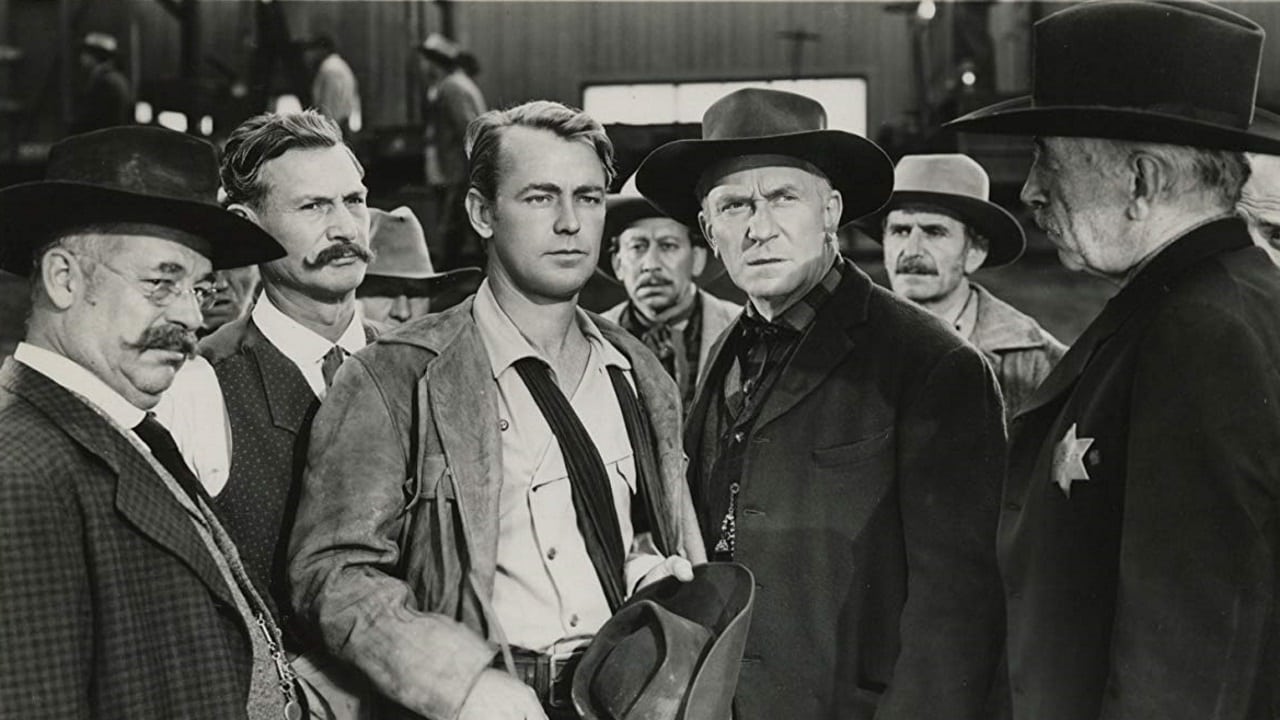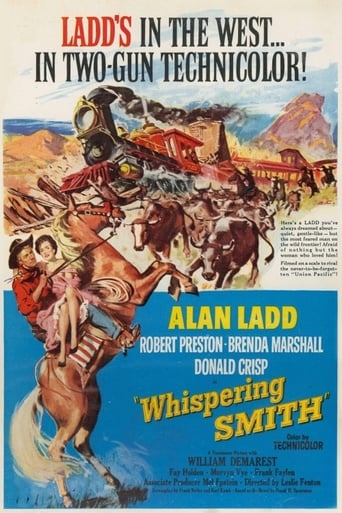weezeralfalfa
I must admit, I've only seen a couple of Alan Ladd films, not even "Shane". Here, his character's personality is that of a very private person, who mostly only speaks when he thinks he has something important to say. He appears to be very low key, but behind that languid stony face with penetrating soulful eyes, he's as tenacious as a bull dog about things he thinks are important, as his long time friend Murray Sinclair(Robert Preston) finds out after Smith(Ladd) discovers his criminal activities relating to the railroad he has long worked for, as has Smith, as a detective.Beefy Robert Preston was often cast by Hollywood as a flawed or unlucky character, often a friend of the lead male or female, who is talked into joining a crooked operation. Another classic example of this is seen in the railroad-dominated de Mille epic : "Union Pacific". Other examples include "Reap the Wild Wind" and "The Last Frontier". Usually, as in the present film, he's marked for eventual death. For a rare role where he is the hero, see the oil epic "Tulsa".It soon becomes clear that Murray married Smith's one time girlfriend(Marian), who still pines for Smith: still unmarried. Smith seems uncomfortable in expressing affectionate emotions, except with his eyes, and prefers a life where he travels around a lot, often in danger of being killed. Murray's breezy garrulous extrovert personality is so different from Smith's, its hard to believe Marian would feel comfortable with both. Apparently, she doesn't really. She's constantly expressing concern about Smith's safety and health, which eventually become wearing on Murray, who becomes jealous of Smith. But that's not the only reason Murray's friendship with Smith becomes unraveled during the course of the film. Smith gradually discovers his increasing involvement in staging train wrecks, then claiming that much of the perfectly undamaged freight is damaged, which is pilfered, often carried to the ranch of his neighbor Barney Rebstock(well played by familiar character actor Donald Crisp). After Murray's new superintendent(the no nonsense McCloud) finds out about his misclassification of freight, he's fired, which just makes him form a closer tie with Barney, with more frequent suspicious train wrecks occurring. Presumably, Murray is now leading the staging of these wrecks, Smith having killed the 3 Barton brothers, who presumably previously staged the wrecks. Smith tries to talk him into moving elsewhere and starting over with a new legitimate life. But Murray gets mad and decks Smith, who them turns to Marian to try to talk Murray into pulling up stakes. Surprisingly, Murray agrees, but is already committed to lead one last train wreck heist. Unfortunately, the law is alerted to this one. He gets shot in the arm and is slowly bleeding to death as he heads for home. Smith and sidekick Bill(William Demarest)follow him plus 2 companions. The companions are shot dead, and Smith has a chance to shoot Murray, but declines. The 2 arrive at Murray's after Murray, but Marian tells them she hasn't seen Murray, after giving them some incriminating info. But Smith detects the lie in her body language, as well as the blood spots on the porch, and doubles back after seemingly leaving. There follows a strange confrontation with Murray: partly antagonistic and partly conciliatory. Murray is now very weak, slouched in a chair. He has an opportunity to shoot Smith in the back, but finally declines it as he collapses onto the floor, thus reciprocating Smith's previous restrain(which he doesn't know about).We may wonder why Smith repeatedly bends over backwards to try to give the uncooperative Murray opportunities to rehabilitate himself. We must assume that either their friendship extends to the very distant past, or perhaps Murray once saved his life, or perhaps he has(or had) a homoerotic relationship with the man(Of course, with the film codes of the time, this possibility wouldn't be made obvious). Even as Murray expires, having just nearly decided to shoot him, Smith squeezes his hand, as an expression of lingering affection. Very unusual!The film begins with Smith leisurely riding his horse through the snow of the low slopes of the Sierras(presumably), then being shot at from a distance, wrongly being assumed dead as a result. We have to assume these men knew he was trailing them, otherwise this makes no sense.(They were the 3 Barton train robbers). Smith's horse was badly wounded, hence useless for him to ride. Thus, he walks toward civilization, which appears as a rail line. He builds a big bonfire as a signal for a train to stop, despite the fact that there is a driving rain that should have extinguished such a fire! Brenda Marshall(Marian) repeatedly looks longingly deep into Smith's eyes, suggesting a deeper affection than usual for the leading lady. Although not stated, I suspect that the other, older, occasionally featured woman: Emmy, also red-haired, is Marian's mother. This would also explain why her husband Bill is a frequent sidekick of both Murray and, especially, Smith. Among the pantheon of villains, none is more chilling than the heavy- lidded, mostly silent, Whitey(Frank Faylon): Barney's right hand man and executioner. Eventually, Barney becomes his victim, when Whitey decides to take his cash from the last train holdup. A little later, Whitey becomes a victim of Smith's pursuit of the thieves.Currently available in a DVD package of 4 '50s westerns, with different leading men.
dougdoepke
Two railroad buddies drift apart when one decides to join a local gang.Good "buddy" western. The soft-spoken Ladd and the voluble Preston play off one another really well. Their friendship appears touchingly real, unusual for movie make-believe. Then too, the movie has a lot of colorful aspects, especially the train wreckage scene that's both well-written and well-mounted, and like no other western set-up I've seen. There's also some great Sierra scenery along with a fine supporting cast. I especially like Frank Faylen's droopy-eyed gunman and Donald Crisp's friendly bad guy. And catch the lovely Brenda Marshall, unusually soulful for a western heroine. In fact, each of the supporting players manages a distinctive personality.Certainly, no one could ever accuse Ladd of over-acting. He was always best when asserting a kind of quiet authority as he does here. Actually, that's an effective way to compete with Preston's naturally big personality. So, when the two have a showdown, it's almost like two complementary personalities tragically splitting apart. Something should also be said of the skillfully thought-out script that manages to mesh the complex plot into a believable whole. Anyway, in my book, it's a colorfully done, generally underrated oater from Hollywood's golden period.
classicsoncall
Alan Ladd portrays railroad cop Luke 'Whispering' Smith in a starring role that probably got him noticed for the character of Shane a few years later, a favorite Western of mine as well as many others. The low key approach worked better in the latter film, where Ladd's character wasn't looking for trouble once he hung up his holster. As a troubleshooter for the Nebraska & Pacific Railroad, you would think Smith would be a bit more flamboyant, but that's not the title of the story. The significance of his name is dealt with in an early scene just before he makes his first appearance, as the old time railroad hands describe his legendary-like status.The picture gives us the classic, though formulaic love triangle that's a staple of many genres, this time with Smith and his best friend Murray Sinclair (Robert Preston) and Murray's wife Marian (Brenda Marshall). The viewer immediately connects with the unspoken relationship between Smith and Marian, and that dynamic stays center stage throughout the picture. Over the course of the story, Murray gradually transforms from a successful rancher and railroad foreman into outright villainy after being fired for essentially looting crates of goods from a planned train wreck.I think this is the first time I've seen Donald Crisp as an outlaw. It's a tribute to his ability as an actor that he pulls it off rather successfully. However the baddie to keep your eye on here is Frank Faylen as the creepy Rebstock henchman Whitey Du Sang. You could have knocked me over with a feather when I finally realized that he also portrayed Dwayne Hickman's dad in 'The Many Loves of Dobie Gillis'. I don't think I've seen him in any other Westerns, which is too bad because he's got that great Klaus Kinski thing going for him and he looks just plain bada--, if you know what I mean.The picture also confirms something for me that I think about every time I see him. Whenever you need a snake oil salesman for a Western flick, the guy to call on is Earle Hodgins. He's on screen here for only a few seconds, and you don't even get to see his face real clearly, but he's right there in the credits to make it official. The role could have been done by anybody, but I guess back in the day, if you're in the film business and you need a character actor to peddle Cherokee Indian Snake Oil, only Earle Hodgins can do it.Well, not to get sidetracked here, the film resolves about the way you would expect it to. The kicker for me was seeing Alan Ladd in your traditional Randolph Scott outfit (all black) for the final showdown. My only question however, would be how did Smith and partner Bill Dansing (William Demarest) get back to the Sinclair house so quickly? It's like they teleported over into the barn because it was only a matter of seconds before they left and were right back again! The only other characters I've ever seen who could do that with time to spare are Tonto and Lash LaRue. Amazing.The end of the story leaves some wiggle room as to what would happen next, but as the viewer, you'll have to decide for yourself. Happy ending fans will no doubt expect Whispering Smith to hook up with his former sweetheart, but that will have to be your call.

